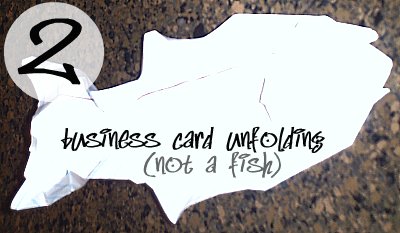
Good News!
The bad thing about a business card is that generally it goes in the pocket with the stack of 50 other cards you’ve been handed, but a great thing is that it doesn’t have to be that way. Pictured above is the business card of @jonray (on Twitter) that he handed me at the Austin Mashable party this past week (which was a blast, by the way). I must confess that I was blown away. Why was I blown away? Because I wanted to take the time to deconstruct it carefully so that I would be able to reconstruct it. I wanted to examine this “note” he passed me at the party in place of a card.What was even more impressive is that when he handed it to @khartline of Mashable, guess where it went? I won’t say where she tucked it, but if you think back to high school, it’s where you hope a pretty girl will keep your love note…
It Made Me Wonder…
So the point of this clever little conversation starter is that @jonray took the time to create an impression, and it made me wonder- do we look for opportunities to create an impression in everything we do, even as small as a business card? If it still looks like a business card, maybe not.

Do You Have to be Cutesy?
Should agents make cute folded notes for potential clients? Maybe not, but I imagine that with inspiration like this, one of you is already cooking up a way to “create an impression” right now.

Benn Rosales is the Founder and CEO of The American Genius (AG), national news network. Before AG, he founded one of the first digital media strategy firms in the nation has received the Statesman Texas Social Media Award and is an Inman Innovator Award winner. He has consulted for numerous startups (both early- and late-stage), and is well known for organizing the digital community through popular offline events. He does not venture into the spotlight often, rather he believes his biggest accomplishments are the talent he recruits and develops, so he gives all credit to those he's empowered.









































Jay Thompson
August 4, 2008 at 7:06 pm
I think it’s brilliant.
Ken Brand
August 4, 2008 at 7:26 pm
It’s remarkable, thanks for sharing.
Think about those indelible first impressions, the first mental image, the opening riff. Great writers open with it. Great films open with it. The Symphony Conductor lifts her baton. Listen to the opening riff of great Rock n Roll songs, you recognize the first two seconds instantly forever.
Want to move people? Open BIG = First mental image/emotion/impact Close BIG = Last mental image/emotion/impact.
For example, your image posts does that in red spades.
Rock ON – kb
Candy Lynn
August 4, 2008 at 7:57 pm
I’s say Hugh -@gapingvoid may just have some competition!
Holli Boyd
August 4, 2008 at 8:17 pm
reaction in one word – awesome
Jamie Geiger
August 4, 2008 at 9:53 pm
It’s the little, unique things that people remember, and it doesn’t have to cost a thing- great idea!
Jayson
August 5, 2008 at 1:46 am
Everyone always says to make an impression, or to be creative, but it’s 1000 times better to see a great example first hand.
first time home buyers loan
August 5, 2008 at 2:31 am
its really mind blowing man !
Jennifer in Louisville
August 5, 2008 at 5:09 am
Interesting spin on an old concept. Definitely made an impression. (Though I wonder how truly effective it will be long term. At the end of the day, you are left with a very large, and easily damaged record of his information. In 6 months, will you still have his contact info – or will the most you remember be “the cool dude, don’t recall his name, that gave me the note on paper”.
I think inserting his “real” card INSIDE the note would have been even better. It would have still gotten his point across – and given you something more durable/convenient for actual use in the long run.
Eric Blackwell
August 5, 2008 at 6:13 am
I think it was a great way to get the attention of the recipient. Like Jennifer, I think that there may be some real value in having the professional business card there as well. Shows them that you can do both. Make a great impression AND be professional.
Eric
Glenn fm Naples
August 5, 2008 at 7:30 am
A very good technique to be different. In addition, to being different – you can read the printing. No matter how a kewl an idea – someone has to be able read it.
Benn – you should have added a disclaimer – this technique can only be used by those individuals whose printing is legible. 🙂
Benn Rosales
August 5, 2008 at 9:43 am
Interesting that another card be used, and maybe he had one, but in this one instance, his approach was compelling, if you read his blog, he even had a plan before attending the conference and wrote about it. He had a goal, he set it, and he executed and he made connections- myself being one of them.
I’m not easially impressed by people, but in this case, it was a total package. I agree that not everyone will be this deliberate and as polished, but that’s why I said this isn’t for everyone, but how about looking harder at the details.
Jon Ray
August 5, 2008 at 5:33 pm
Thanks for the write-up! A lot of great advice here in the comments section. Just wanted to say to #8 & #9 that I agree and I already have had a graphic artist draw up the cards that will be inserted into the folded pieces, but at this particular conference, they were not printed yet.
I also think that it is important to always follow up with people on a regular basis. It’s true that a person might lose or damage the paper contact I was giving out, but I make sure to follow up with all of my contacts multiple times a year, so that they will always remember who I am. The point is that by making a knock-out first impression, they will welcome any other correspondence that I send in the future.
Thanks, again to everyone who commented. I’d encourage you to continue the discussion over at my blog, if you like. At The Papertank we are constantly creating unique marketing ideas for our clients and I would love to get into a discussion about other things that have stood out to you and made a lasting impression.
-jonray